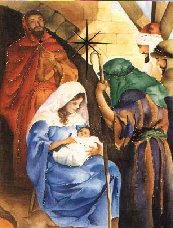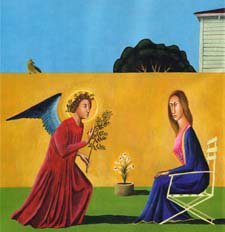
January 1, 2006. It's New Year according to the civil western calendar. But is this the reason why Catholics go to Mass? Is it to thank God for the year that was and to ask for his blessing for the year that is to be?
No.
January 1 is the solemnity of Mary, Mother of God. This solemnity is a reiteration of what took place on Christmas. It asserts the fact that the baby who was born in a stable is not only a man. He is also God.
No. She did not give the divinity to Jesus. She is only human. You can not give what you do not have. She can only give to Jesus her humanity.
How then can she be Mother of God? (We have to make use of philsophy here.)
Mothers do not carry human natures in their womb. What they carry in their womb are persons.
Mary did not carry in her womb a human nature. She carried a person. And this person is the Second Person of the Blessed Trinity. In St John's language, the Logos (Word). Hence, in the Angelus we pray: "And the Word was made flesh (human being) and dwelt among us."
It is important to note that the articles of faith about the Blessed Virgin and the celebrations in her honor are always in connection with Jesus Christ. True Marian devotion is Christo-centric.
To conclude, what does our faith tell us about Jesus Christ and Mary?
- That in Jesus, there is one Person, a divine Person, with two natures, human and divine.
- That Mary is the mother of God because she gave birth to the person Jesus who is God.







